Art Fairs
See the Top Ten Booths at Photo London 2015
At last, London gets its much-awaited photography fair, and it’s brilliant.
At last, London gets its much-awaited photography fair, and it’s brilliant.
Lorena Muñoz-Alonso

Today, the first edition of Photo London art fair is opening its doors to the public. Over 70 international galleries are taking over the rooms and corridors of Somerset House, a former Tudor palace at the heart of London now devoted to an ambitious cultural program.
Supported by Maja Hoffmann’s LUMA Foundation, Photo London is, according to its organizers, the largest photography fair ever staged in the city. It’s a much-needed addition to London’s busy art fair calendar, where the lack of a photography-focused fair was noticeable (see Photo London Brings Photography’s Best to the English Capital).
One wonders if this new fair is perhaps a consequence of the unstoppable success of its French neighbor, Paris Photo (see Take a Sneak Peek at Riches of Paris Photo 2014), a highly celebrated photo fair that also has a profitable Los Angeles-based spin off (see Paris Photo Los Angeles Is Set to Have Its Best Year Yet—See Why).
London, indeed, has welcomed the fair with open arms, launching a full-fledged “London Photo Week” in response. The city’s biggest museums and galleries—from Tate Modern and the V&A to Marian Goodman Gallery—have scheduled photography shows to coincide with the fair (see artnet Asks: Star Photographer Thomas Struth).
Meanwhile, the city’s top auction houses are also hosting sales of vintage and contemporary works during the week. Christie’s has launched Modern and Contemporary British Photography, an online auction that began on May 12 and ends today. Phillips is hosting a photography sale today, and Sotheby’s another one on Saturday.
Martin Roth, director of the Victoria & Albert Museum, joked during the fair’s press presentation that he was “jealous” of the warm reception and the buzz generated by Photo London. “Most fairs take a few editions to settle, but Photo London has started like a rocket,” he said.
A few minutes into the VIP preview of Photo London yesterday morning, it was hard to disagree with him. The aisles of Somerset House were heaving with collectors and journalists, while tantalizing bottles of Ruinart champagne glistened on the tables of the booths, waiting to be popped.
artnet News brings you the ten best booths from the first edition of Photo London.
1. Robert Klein, Boston
Classic, black and white photography was ubiquitous in this first edition of the fair, and of the several booths that chose to presents staples of the genre, Robert Klein certainly convinced. The booth offered a generous display of works by Horst P. Horst, Walker Evans, Richard Avedon, Henri Cartier-Bresson, and Edward Weston among others. But it was two small works that stole the show: a photograph of Henri Matisse sketching a model by Brassaï, and another one by Francesca Woodman, both inconspicuously hung in the outer wall of the booth.
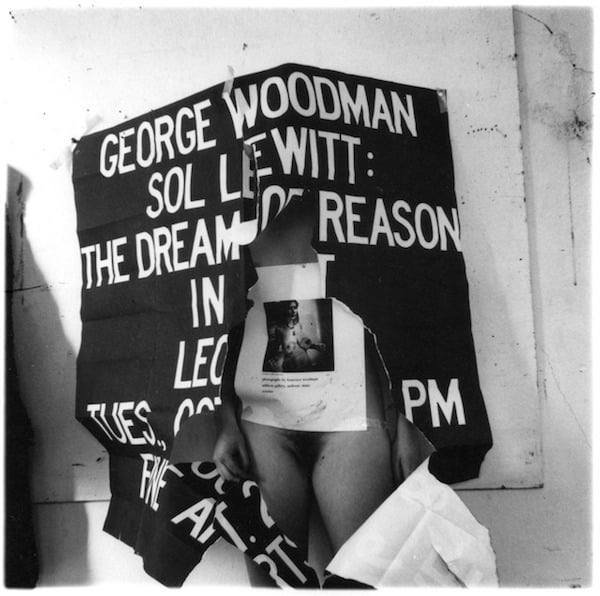
Francesca Woodman, Untitled (George Woodman, Sol Lewitt, Francesca Woodman) (c. 1976)
Photo: Courtesy Robert Klein, Boston
2. Timothy Taylor Gallery, London
Works by photography legend Diane Arbus were in ample supply at the fair, with pieces cropping up at several booths. But the curated solo presentation of works displayed at Timothy Taylor was the most extensive celebration of Arbus’s oeuvre at the fair. “Couples” gathered a large group of images taken by the New Yorker from the 1950s to the 1970s, all of them featuring the motif of the couple (or duo), from the iconic image of two young lovers sitting on a bench on Washington Square to a couple engaging in S&M activities.

Diane Arbus, Young couple on a bench in Washington Square Park, N.Y.C. (1965)
Photo: © The Estate of Diane Arbus, LLC Courtesy Timothy Taylor Gallery, London
3. Steven Kasher Gallery, New York
Speaking of classics, Steve Kasher’s booth offered a veritable lesson in the history of photography, with a selection of black and white images by iconic photographers from the 1960s, including Avedon, Arbus, Elaine Mayes, Vivian Maier, Jerome Liebling, and Fred W. McDarrah. But, quite cleverly, the gallery also devoted a second room to contemporary photographers; stepping from the “classic” to the contemporary room felt like entering a whimsical world of color, with excellent works by Miles Aldridge and Marianna Rothen.
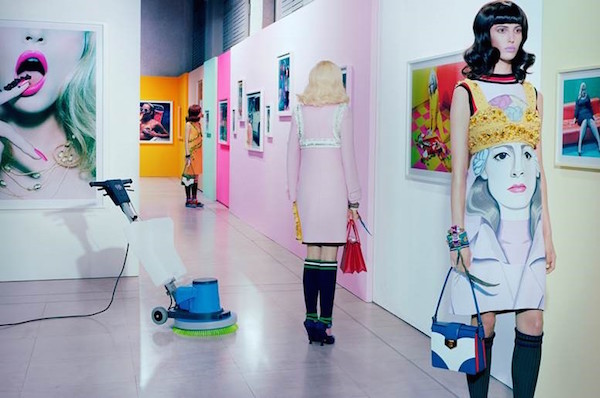
Miles Aldridge, The Cult of The Self #3 (2013)
Photo: Courtesy Kasher|Potamkin
4. Roman Road, London
In the “Discovery” section of the fair, devoted to young galleries, the best discovery was twofold, comprising a gallery and the artist it was showing. Roman Road, a young East London gallery founded in 2013, displayed a solo show by Thomas Mailaender, a French photographer working with found images and the cyanotype technique. This low-cost technique produces blue-cyan images as a result. Mailaender’s appropriated images, found in second-hand markets and turned into a ghostly blue, were as beguiling as undecipherable.
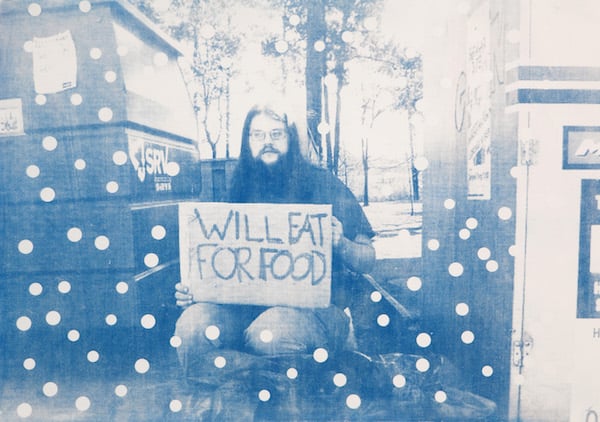
Thomas Mailaender, Will Eat for Food (2013)
Photo: Courtesy Roman Road, London
5. The Ravestijn Gallery, Amsterdam
Also in the “Discovery” section, Ravestijn Gallery directors Jasper Bode and Narda van ’t Veer presented a carefully curated group show featuring four of their represented artists: Darren Harvey-Regan, Ruth van Beek, Eva Stenram, and Jean-Françoise Lepage. Lepage was a stand-out, with his disturbing photographs of scantily clad women in domestic settings reworked with plastic materials and re-photographed, which added a layer of texture—and confusion.
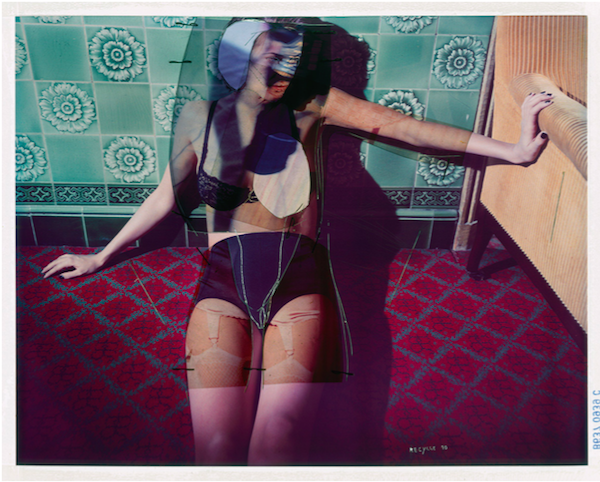
Jean-Françoise Lepage, Recycle 10 (2014)
Photo: Courtesy The Ravestijn Gallery, Amsterdam
6. Christopher Guye Galerie, Zurich
Guye, whose gallery is specialized in artists working with photography, presented a group of works by contemporary artists, ranging from fashion photographer Nick Knight to Swedish-model-turned-photographer Lina Scheynius, whose images explore sexuality and daily life in a manner that brings to mind the confessional oeuvre of Ryan McGinley (see Major Ryan McGinley Exhibition Opens in the Netherlands), Wolfgang Tillmans, and Corinne Day. At the far end of the booth, a simple, large-scale image of cherry blossoms in light pink hues by Japanese photographer Risaku Suzuki (Sakura N-14, 2002) was nothing short of breathtaking.
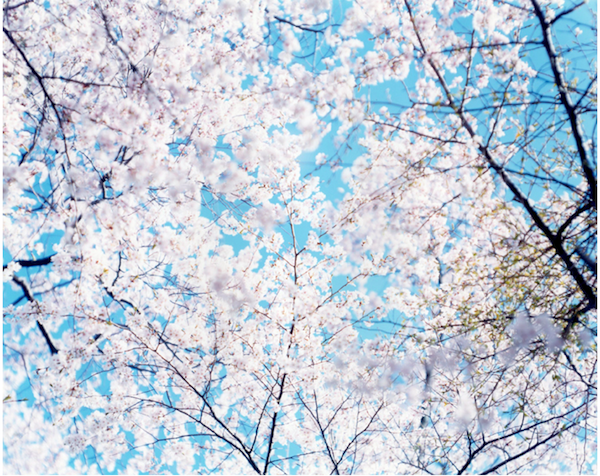
Risaku Suzuki, Sakura N-14 (2002)
Photo: Courtesy Christopher Guye Galerie, Zurich
7. Bernheimer Fine Art, Lucerne/Munich
Nearby, Bernheimer Fine Art had staged a face-off between Horst and Annie Leibovitz. In two opposite walls, a large print of the iconic portrait of Louise Bourgeois taken by Leibovitz in 1997, in which she is holding up her wrinkled hand, seemed to echo Horst’s Vogue cover, in which a feminine hand is tearing a hole in a wall.
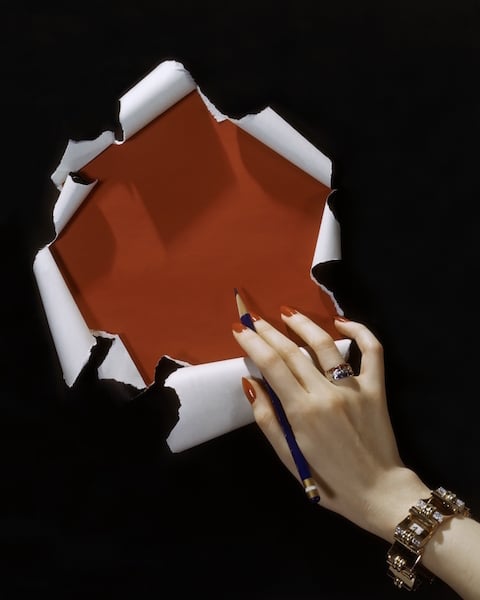
Horst P. Horst, Vogue 1942 Model’s hand wearing a diamond and gold wristwatch and a ring of sapphires, rubies, and diamonds by Cartier
Photo: Courtesy Bernheimer Fine Art, Lucerne/Munich
8. Riflemaker, London
The London-based gallery was one of the few that chose to present a solo booth, and it certainly paid off. The presentation of works by Penelope (“Penny”) Slinger was absolutely phenomenal. London-born Slinger, who worked mostly with photo-collage, achieved some recognition in the “Swinging London” of the 1960s and 70s before moving to the Caribbean, via New York, and falling into obscurity. But her highly sensual, dark, and esoteric collages of Surrealist undertones seem more current now than ever. Riflemaker in London and Broadway 1602 in New York are leading the re-discovery and re-assessment of an artist that epitomizes a moment in history when women (and women artists) took ownership of their sexual potential.
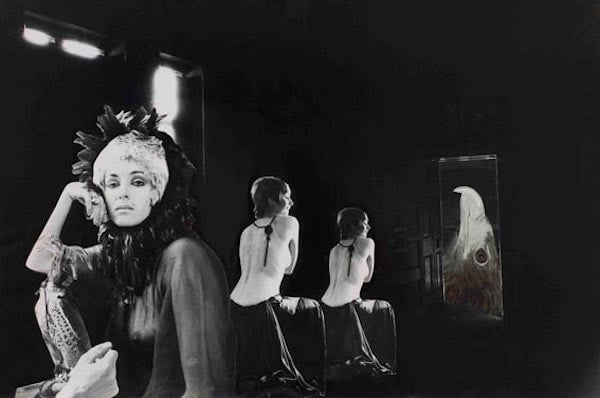
Penelope Slinger, Bird in the Hand (1977)
Photo: ©Penelope Slinger Courtesy Riflemaker, London
9. Danziger Gallery, New York
In a fair where black and white images seemed to dominate, the booth of Danzinger was a riot: colorful, humorous, and quite cheeky (what’s not to like?). Two artists stood out: Robert Toren and Enoc Perez. Toren’s mash-up of Imogen Cunningham’s portrait of Frida Kahlo and Robert Mapplethorpe’s iconic shot of Patti Smith for her Horses album cover was absolutely hilarious. Perez’s works with appropriated fashion images, to which he had applied an “arty” twist (à la Picasso and à la Matisse) were as easy on the eye as they were engaging.
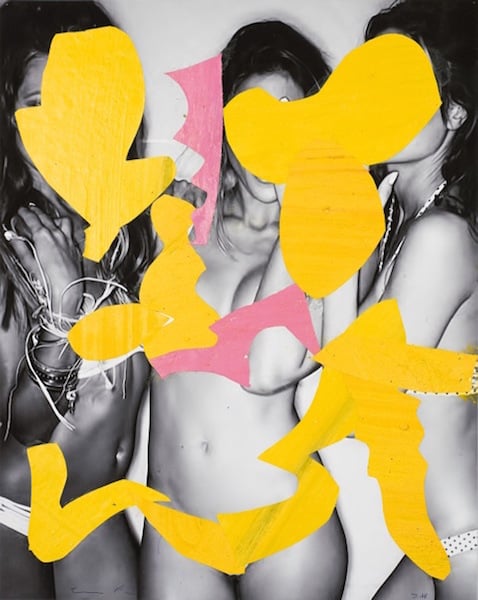
Enoc Perez, Selected Cut-Outs (2014-2015)
Photo: Courtesy Danziger Gallery, New York
10. Edwynn Houk Gallery, New York/Zurich
Last but not least, Edwynn Houk Gallery championed an extravaganza of beautiful classics: iconic portraits of Christy Turlington and Cindy Crawford by Herb Ritts, a slew of images by Bill Brandt, Man Ray, Vik Muniz, Weston, Stephen Shore… For photography lovers, this booth, and the whole fair in general, will surely be an affair to remember.
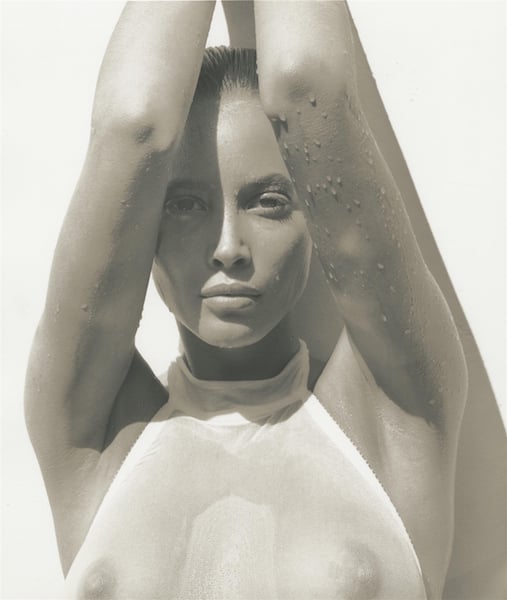
Herb Ritts, Christy in White, Los Angeles (1988)
Photo: Courtesy Edwynn Houk Gallery, New York/Zurich
Photo London takes place at the Somerset House, London, from May 21-24.